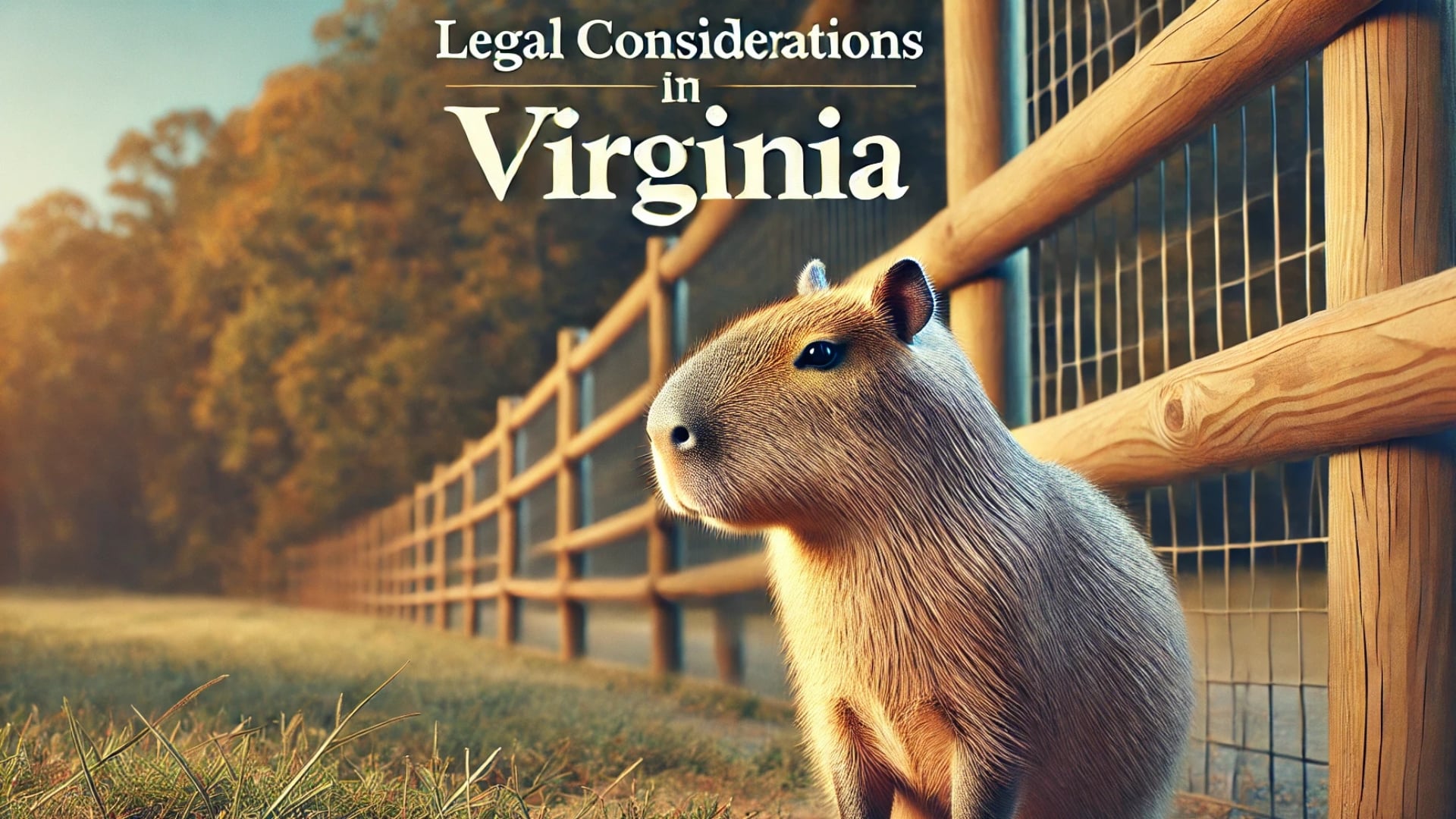Yes, you can own a capybara in Virginia, but you will need to obtain the proper permits. Virginia requires an Exotic Animal Permit for those interested in owning a capybara, which involves meeting certain requirements related to housing, care, and animal welfare. The Department of Game and Inland Fisheries oversees the process and may also conduct inspections to ensure your property is suitable for these semi-aquatic rodents.
Legal Considerations in Virginia

When it comes to owning a capybara in Virginia, legality is the first and foremost concern. While capybara ownership is permitted in Virginia, it is regulated under the state’s exotic animal laws. Virginia’s Department of Wildlife Resources oversees the approval process for owning non-domesticated animals like capybaras. To legally own a capybara, you will need to apply for an Exotic Animal Permit, which ensures that prospective owners meet specific standards in terms of housing, animal care, and safety.
The permit application process involves providing detailed information about your property, your experience with exotic animals, and your plan for the capybara’s care. It is important to emphasize that Virginia’s wildlife officials may conduct inspections of your property to ensure it is suitable for housing a capybara. This means having a large, secure enclosure with access to water since capybaras are semi-aquatic animals and need the ability to swim.
In addition to the state permit, it is also essential to check local regulations in your specific county or city. Some municipalities may have additional restrictions or requirements for exotic pets. For example, while the state may allow capybara ownership, certain counties or homeowner associations may have their own rules prohibiting or limiting the ownership of exotic animals. Therefore, always consult with local authorities before proceeding with your capybara ownership plans.
Ethical and Welfare Considerations
Beyond legal aspects, it is critical to evaluate the ethical implications of keeping a capybara as a pet. Capybaras are highly social creatures that live in large groups in the wild. This social structure must be replicated in captivity to prevent isolation and stress.
One of the biggest ethical concerns with keeping a capybara is their social needs; they should never be kept alone. A solitary capybara can suffer from stress, anxiety, and depression if deprived of companionship. As such, potential owners must be prepared to adopt at least two capybaras so they can bond with each other rather than becoming overly attached to humans.
Capybaras also have specific environmental needs, as they are semi-aquatic animals. In the wild, they spend a great deal of time in the water to regulate their body temperature and protect their sensitive skin from the sun. This means capybaras kept as pets require not only a large outdoor space but also access to a pool or water feature where they can swim and cool off regularly. Ensuring that their enclosure provides adequate space for land and water activities is essential for their well-being.
Another ethical consideration is the long-term commitment involved in caring for a capybara. Capybaras can live up to 12 years in captivity, and during this time, they require daily care, regular socialization, and specialized veterinary attention. Owning a capybara is far more demanding than keeping a traditional pet like a dog or a cat, and this commitment should not be taken lightly.
If you’re wondering about the legalities of owning a capybara in other states, check out the regulations for Georgia.
Capybara Petting and Diet in Virginia
Capybaras are known for their gentle and friendly demeanor, making them popular as pets and even in petting zoos. In Virginia, capybara petting is usually only feasible in homes or facilities that are properly equipped to handle their specific needs. However, the idea of treating capybaras purely as “petting” animals should be approached with caution.
While capybaras can become tame, they are still wild animals with natural behaviors that must be respected. It’s important to let them approach you on their own terms rather than forcing interaction, as this can cause stress. When well-socialized and handled gently, capybaras can enjoy being petted, but they should always have the choice to retreat to their own space if they feel uncomfortable.
Regarding their diet, capybaras in Virginia must be fed a diet that closely resembles what they eat in the wild. Capybaras are herbivores, and their diet consists mainly of grasses and aquatic plants. In captivity, their diet should primarily include high-quality hay, such as Timothy or Orchard grass hay, which can be easily sourced from pet stores or agricultural feed suppliers. These hays provide the necessary nutrients and help maintain proper dental health, as capybaras have continuously growing teeth that must be worn down through constant chewing.
Additionally, capybaras should be provided with fresh vegetables like carrots, sweet potatoes, and leafy greens, but these should be offered sparingly to avoid digestive issues. Capybaras are prone to vitamin C deficiency, which can lead to scurvy. Therefore, guinea pig pellets fortified with vitamin C should be included in their diet to ensure they receive the necessary nutrients.
It’s essential to monitor their water consumption and ensure they have access to clean, fresh water at all times. Capybaras not only drink water but also use it for bathing and defecating, which means the water in their enclosure needs to be changed frequently to maintain hygiene. Florida is another popular state where people consider owning capybaras. Find out the legalities here.
Owning a Capybara in Virginia
While owning a capybara in Virginia is legal with the proper permits, it is a significant commitment that requires careful consideration. These animals are not typical pets, and they need plenty of space, social interaction, and specific care to thrive. If you’re up for the challenge, capybaras can make rewarding companions due to their gentle and friendly nature. However, always check with local authorities before adopting one to ensure that you meet all legal requirements.
Before bringing a capybara into your life, it’s crucial to do thorough research and understand the responsibilities involved. This includes ensuring your property is suitable, finding a knowledgeable veterinarian, and obtaining the proper permits. By doing so, you can provide a happy and healthy environment for your capybara and enjoy the company of one of nature’s most unique creatures.



